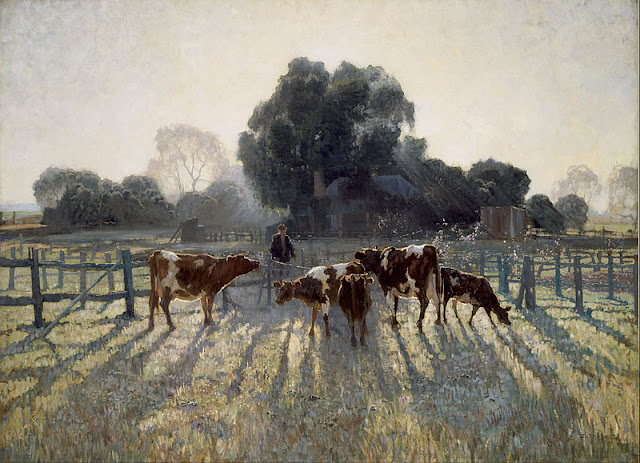Maud Lewis: The Joyful Painter of Nova Scotia
Imagine a world where vibrant colors and cheerful scenes transport you to a simpler time, a world where optimism reigns supreme despite adversity. Welcome to the enchanting world of Maud Lewis, one of Canada's most beloved folk artists. Born in 1903 in South Ohio, Nova Scotia, Lewis's life was marked by physical challenges and poverty, yet her artistry remains a testament to resilience and joy.
Early Life and Inspiration
Maud Lewis was born into a relatively comfortable life, but her childhood was soon overshadowed by health issues. She contracted juvenile rheumatoid arthritis, which limited her mobility and forced her to leave school at 14. Despite these challenges, Lewis found solace in art, thanks to her mother, who taught her to create watercolor Christmas cards. These early lessons laid the foundation for her future as a folk artist.
After her parents passed away, Lewis moved to Marshalltown, where she met her future husband, Everett Lewis. They married in 1938 and lived in a small cabin with no indoor plumbing or electricity. Yet, within these humble walls, Lewis's art flourished. She decorated their home with her paintings, transforming it into a vibrant gallery that reflected her optimistic outlook on life.
Notable Works
Maud Lewis's paintings are a window into her joyful world, filled with animals, landscapes, and flowers. Here are some of her most notable works:
Three Black Cats (1955)
Fall Scene with Deer (c.1950)
Team of Oxen in Winter (1967)
British Kingfisher & Apple Blossoms (1963)
Drying Cod Flakes (mid/late 1950s)
Eddie Barnes & Ed Murphy Going Fishing (1965)
This painting reflects Lewis's interest in capturing scenes of local life and traditions.
Two Horses Ploughing (c.1960)
Sold at auction for $49,250, this piece is notable for its depiction of horses, a less common subject in Lewis's work.Ox Team Hauling Logs with Single Horse-Drawn Sled in Distance (c.1960)
Spring Sleigh Ride
A charming winter scene that captures the beauty of rural Nova Scotia, estimated to sell between $10,000 and $15,000.
Legacy
Maud Lewis's legacy extends far beyond her art. She is celebrated for her resilience and creativity in the face of adversity. Her work continues to inspire artists and art enthusiasts worldwide, offering a glimpse into rural Nova Scotia's past. The Art Gallery of Nova Scotia houses many of her works, and her restored home remains a testament to her artistic spirit.
But what makes Lewis's story so compelling? Perhaps it's the way she transformed her simple surroundings into vibrant works of art, or maybe it's the joy and optimism that radiate from each painting. Whatever the reason, Maud Lewis has become an iconic figure in Canadian art history, reminding us that even in adversity, creativity can flourish.
Lewis's story was immortalized in the 2016 biopic *Maudie*, further increasing interest in her life and art. Today, her paintings are highly valued, selling for tens of thousands of dollars, a stark contrast to the few dollars they fetched during her lifetime. Despite never having a museum exhibition during her life, Lewis is now recognized as one of Canada's most beloved folk artists, leaving behind a legacy of joy and optimism through her art.
Citations:
[1] https://aestheticsofjoy.com/painting-joy-maud-lewis/
[2] https://www.aci-iac.ca/art-books/maud-lewis/biography/
[3] https://news.artnet.com/art-world/maud-lewis-oeno-gallery-2433989
[4] https://en.wikipedia.org/wiki/Maud_Lewis
[5] https://www.aci-iac.ca/art-books/maud-lewis/key-works/three-black-cats/
[6] https://www.aci-iac.ca/art-books/maud-lewis/style-and-technique/
[7] https://www.heffel.com/Artist/5E5D5A57/Lewis_Maud/
[8] https://www.deepspacesparkle.com/maud-lewis-folk-art-projects/
[9] https://www.nfb.ca/film/maud_lewis_a_world_without_shadows/
[10] https://aestheticsofjoy.com/wp-content/uploads/2023/08/maud.jpeg?sa=X&ved=2ahUKEwjah5bw8b6MAxVlXGwGHer6EcQQ_B16BAgDEAI
[11] https://www.mutualart.com/Artist/Maud-Lewis/92809E72BDFF0E32
[12] https://www.tallengestore.com/collections/maud-lewis
[13] https://www.artsy.net/article/artsy-editorial-joyous-overlooked-canadian-folk-artist-maud-lewis
[14] https://maudlewis.ca/about/
[15] https://www.thecanadianencyclopedia.ca/en/article/maud-lewis
[16] https://www.lochgallery.com/artist/maud-lewis/
[17] https://mcmichael.com/event/maud-lewis/
[18] https://www.artnet.com/artists/maud-lewis/
[19] https://levisauctions.com/historical-results/catalogue/?artistname=Lewis%3B+Maud

%20-%20Paintingartisan.jpg)
%20-%20Paintingartisan.jpg)


%20%20-%20Paintingartisan.jpg)

%20%20-%20Paintingartisan.jpg)
%20%20-%20Paintingartisan.jpg)
%20-%20Paintingartisan.png)
%20-%20Paintingartisan.jpg)








